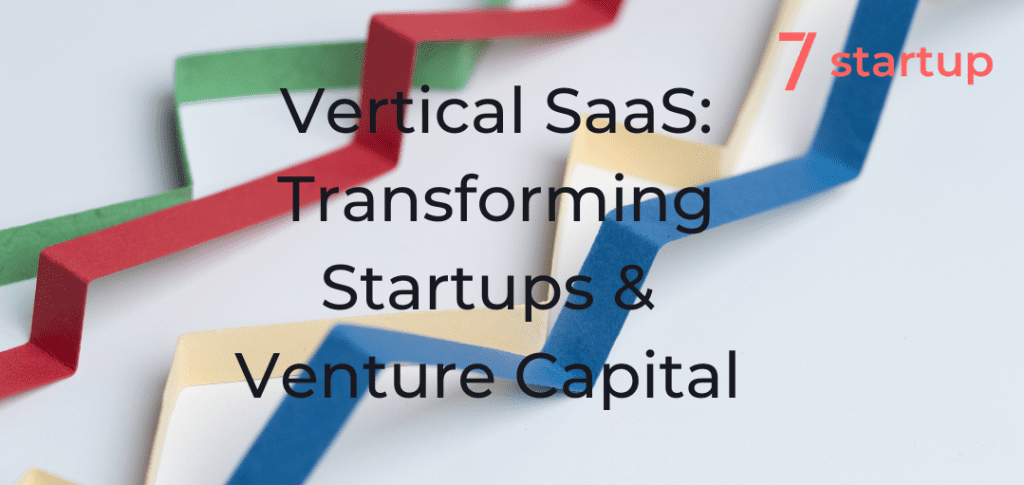In the dynamic world of startups and venture capital, a captivating phenomenon called Vertical Software as a Service (SaaS) has emerged in the past decade. This specialised subset of SaaS has revolutionised startups and attracted venture capital firms. Join us at 7Startup as we explore the transformative power of Vertical SaaS, its impact on startups, and its allure for venture capital.
Understanding Vertical SaaS: Redefining Industry-Specific Solutions
Vertical SaaS, also known as niche or industry-specific SaaS, offers tailored software solutions that precisely address the unique needs of specific industries. Unlike horizontal SaaS solutions, which provide general-purpose tools, this delves deep into industry intricacies, providing customised functionalities and domain expertise. By honing in on specific verticals, these solutions effectively tackle industry-specific pain points that generic software fails to adequately resolve.
 The Benefits of Vertical SaaS:
The Benefits of Vertical SaaS:
- Enhanced Efficiency: It streamlines workflows, automates processes, and optimises operations, resulting in heightened efficiency and productivity for startups operating within specific industries.
- Customisation and Flexibility: These solutions provide extensive customisation options, enabling startups to adapt and evolve according to industry-specific needs, compliance requirements, and market dynamics.
- Domain Expertise: Vertical SaaS providers possess deep industry knowledge, offering specialised insights, functionalities, and best practices that empower startups to make informed decisions and gain a competitive advantage.
The Rise of Vertical SaaS: A Decade of Growth
Over the past ten years, Vertical SaaS has experienced remarkable growth, attracting startups seeking to disrupt traditional industries and captivating the attention of venture capital firms looking for groundbreaking opportunities. Let’s explore some key insights that shed light on this growth:
- Market Size and Revenue: The global Vertical SaaS market reached a staggering valuation in 2022 and shows no signs of slowing down. This exponential growth can be attributed to the escalating demand for specialised software solutions across diverse industries.
- Industry Adoption: These solutions have gained significant traction in sectors such as healthcare, real estate, finance, logistics, and beyond. Startups within these industries have increasingly embraced Vertical SaaS to optimise operations, gain a competitive edge, and meet industry-specific compliance requirements.
- Venture Capital Investments: Venture capital firms have recognised the immense potential of Vertical SaaS and are actively investing in startups operating in this space. In the past five years alone, VC investments in Vertical SaaS companies have surged, reflecting the confidence and belief in the scalability and profitability of industry-specific solutions.
Unlocking the Potential: Vertical SaaS and Startup Success
Startups often face unique challenges, from scaling operations to acquiring customers and raising funds. Vertical SaaS has emerged as a game-changer for startups, offering the following benefits:

- Faster Time-to-Market: Vertical SaaS equips startups with ready-to-use solutions, accelerating their go-to-market strategy and allowing them to focus on core competencies rather than spending valuable time and resources on software development.
- Competitive Edge: By leveraging this technology, startups can gain a significant competitive edge over industry incumbents. Additionally, these solutions provide access to advanced features and functionalities that were previously only available to large enterprises.
- Scalability and Growth: These solutions are designed to scale alongside businesses, ensuring that startups can seamlessly accommodate their growth trajectory. Moreover, this scalability eliminates the need for costly infrastructure upgrades or software replacements, saving both time and money.
Navigating the Future:
Trends and Opportunities
Looking ahead, the future of Vertical SaaS appears promising, with several trends and opportunities on the horizon:
- AI and Machine Learning Integration: The integration of Artificial Intelligence (AI) and Machine Learning (ML) technologies will further enhance the capabilities of these solutions. This will offer advanced analytics, predictive insights, and automation, thereby driving even greater value for startups.
- Continued Industry Expansion: While it has already made significant inroads into various sectors, there are still untapped industries and niches that present tremendous opportunities for startups and investors alike. From agriculture to legal services, the potential for tailored solutions is vast.
- Collaborations and Partnerships: To tackle complex industry challenges, collaborations between Vertical SaaS providers, startups, and established enterprises will become crucial. These partnerships will foster innovation, enable knowledge sharing, and result in more robust and comprehensive solutions.
Furthermore, recent data and insights provide valuable perspectives on the growth and resilience of Vertical SaaS. Since January 2020, the total market cap of the Vertical SaaS Index has grown by 30%, with Fractal’s vertical SaaS index remaining above its pre-pandemic highs. Over the past two years, the total LTM revenue of companies in the index has doubled from $14.9 billion to $29.5 billion. Notably, among the companies whose market cap increased during this period, the median increase was 27%. These statistics instill confidence in the resilience of Vertical SaaS as an industry and signal the continued growth of such companies in the years ahead. Here are some notable examples of Vertical SaaS companies in 2023:
Specialising in providing innovative software solutions for the healthcare industry. Their platform streamlines patient management, electronic health records, and telemedicine services.
PropTech Innovators:
A company revolutionising the real estate sector with their advanced software tools. They offer solutions for property management, tenant portals, and smart building automation, optimising operational efficiency.
FinTech Experts:
This company focuses on delivering cutting-edge financial technology solutions. Their platform enables seamless transactions, automated accounting, and regulatory compliance for financial institutions and startups in the finance industry.
AgriTech Solutions:
This company specialised in agriculture, offering intelligent software for crop monitoring, yield prediction, and supply chain management for farmers. Their solutions help optimise farming operations and increase productivity.
LegalTech Innovations:
This company offers comprehensive legal software solutions, automating case management, document generation, and contract review processes. Their platform enhances efficiency and accuracy for law firms and legal professionals.
EdTech Pioneers:
A company transforming education with their innovative software tools. Their platform facilitates online learning, student assessment, and educational content management, empowering educational institutions to deliver quality education remotely.
LogiTech Solutions:
This company specialises in logistics and supply chain management. Their software platform optimises inventory management, route planning, and order tracking, helping businesses streamline their logistics operations.
Furthermore, these examples highlight the diverse range of such companies operating in various industries, showcasing their ability to provide industry-specific solutions and drive innovation in their respective sectors.
Read more about other top companies in Vertical SaaS
Conclusion
Over the past decade, Vertical SaaS has transformed startups and attracted venture capital investments. Its industry-specific focus, customisation capabilities, and domain expertise drive operational efficiency and success. Looking ahead, the sector’s growth promises innovation and collaboration, fueling the startup ecosystem and captivating venture capital.

Amit Khanna, 7startup Founder
Amit has two decades of experience in the industry and an MBA. He supports entrepreneurs with every aspect of their business including concept and product development, investor presentations, and fundraising. Amit & 7startup assist startups in the pre due-diligence process and help connect them to our vast network of investors. Reach out to us today and see if we’re a fit!




